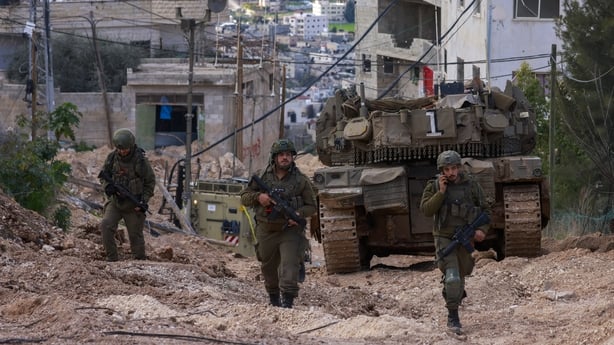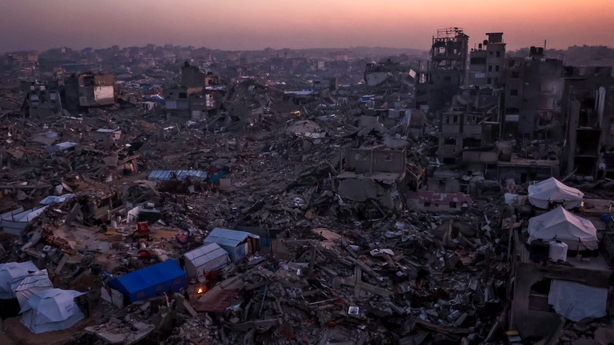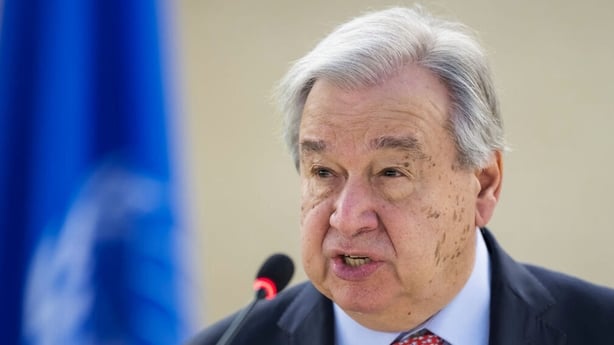Israel's foreign minister Gideon Saar has criticised European Union member states for not backing the US resolution at the United Nations which failed to mention Russia’s aggression in invading Ukraine or condemn the invasion, RTÉ News understands.
He made the criticism during a long-awaited meeting in Brussels of EU foreign ministers and an Israel delegation, led by Mr Saar.
The US resolution, which withdrew any criticism of Russia, was seen as a stunning reversal of decades of US policy at the UN, overturning years of the US aligning itself with its European allies when it came to Russia and Ukraine.
Mr Saar's intervention was one of several where there was clear friction with the EU, despite the warm words which accompanied the first meeting of the EU-Israel Association Council since 2022.
The EU’s foreign policy chief, Kaja Kallas, said the meeting opened with a mutual condemnation of Hamas’s attack on 7 October 2023.
However, during a news conference she described the meeting as "candid" and said the EU side was "closely watching developments, and [we] cannot hide our concern when it comes to the West Bank".
It is understood Mr Saar referenced US President Donald Trump’' proposal to clear Palestinians out of Gaza and turn the enclave into a "Riviera".

According to one senior source, Mr Saar said there was no issue if people wished to leave a location and another country was prepared to accept them.
He elaborated on his remarks during the news conference which followed the meeting.
He told reporters: "A free choice of every person should be respected, and when we are talking about immigration, when we are speaking about [the] free choice of the individual, and on the other hand, a state which is ready to accept this individual, it is the most moral and humane thing to do."
It is understood that Ms Kallas replied to his remarks during the meeting that a similar right extended to Palestinians, and that was the right to remain at home.
Asked if it was appropriate the the new German chancellor, Friedrich Merz, should welcome Israeli prime minister Benjamin Netanyahu, given the International Criminal Court (ICC) arrest warrant against him, Ms Kallas said that the EU "supports the ICC and [the] neutrality and functioning of the ICC".
She added that all EU member states were signatories to the Rome Statute, on which the ICC is founded, adding that it was up to member states on how they comply with ICC warrants.
Following the meeting, Tánaiste Simon Harris said the preparatory work ahead of the Association Council had forged a joint statement which showed EU unity on supporting the UN agency for Palestinian affairs (UNRWA), as well as a two-state solution.
"I take heart from the fact that we now have a written document unanimously agreed by all European Union member states that commits to a two-state solution, that commits to UNRWA, commits to respect for international law, commits and talks about the importance of protecting children during war," he told RTÉ News.
Asked if Israel would be more emboldened in its objectives given Mr Trump's radical plans for the Middle East, Mr Harris said: "The Israeli government could not have left the meeting with any clearer impression than that the European Union is resolute in its view that you cannot have the involuntary displacement of people, and that Palestinian people have every right to live in their homeland in peace and security, just as Israeli people have every right to live in peace and security as well."
The Tánaiste said Irish officials had worked hard to ensure text was inserted in the EU position paper which emphasised that preferential trade arrangements distinguished between goods coming from Israel and those coming from the Occupied Territories.
Officials have suggested Ireland sought to strengthen the EU language on the issue, to emphasise the EU’s commitment to international law, in light of the International Court of Justice (ICJ) opinion last July which declared Israel’s continued occupation illegal.
The Tánaiste said: "The Irish team worked very hard at a European level, to make sure that the document published today by the EU very clearly recognizes the difference between the State of Israel and the illegally occupied territories.
2That is important in many ways. It's been long standing, but it's important to see it in a black and white text at a European level.
"It ensures that we will continue to engage at EU level about making sure human rights clauses in association agreements aren't just there to pad out an agreement, but actually mean something.
"And certainly we would have conveyed that today, because the EU document is very clear that the relationship in the association agreement with Israel is grounded in respect for international law and human rights."

Rights groups urge EU to take 'tough line' with Israel
Rights groups had urged the EU to take a tough line with Israel at the meeting over its alleged abuses, with Human Rights Watch saying it should not be "business as usual".
"The only purpose of this Association Council meeting should be to call out those crimes and to announce long overdue measures in response," the group said.
The International Committee of the Red Cross expressed its concern over the impact of a weeks-long Israeli offensive in the occupied West Bank.
"The International Committee of the Red Cross is deeply concerned with the impact of ongoing security operations on the civilian population in Jenin and Tulkarem, Tubas and other locations in northern West Bank," it said in a statement.
"People are struggling to access basic needs such as clean water, food, medical care and shelter," it added.

UN chief António Guterres also voiced alarm at rising violence by Israeli settlers in the West Bank and calls for annexation.
"I am gravely concerned by the rising violence in the occupied West Bank by Israeli settlers and other violations, as well as calls for annexation," António Guterres told the United Nations Human Rights Council in Geneva.
Also yesterday, Israel's military announced tank deployments in Jenin, where it was "expanding" operations.
This marks the first time tanks have operated in the West Bank since the end of the second Palestinian intifada, or uprising, in 2005.
Violence in the West Bank has surged since the start of the Gaza war that began after 7 October 2023.
Mr Guterres this morning stressed the importance of the fragile ceasefire in place in Gaza since 19 January.
He said: "We are witnessing a precarious ceasefire. We must avoid at all costs a resumption of hostilities. The people in Gaza have already suffered too much.
"It's time for a permanent ceasefire, the dignified release of all remaining hostages, irreversible progress towards a two-state solution, an end to the occupation, and the establishment of an independent Palestinian state, with Gaza as an integral part."






